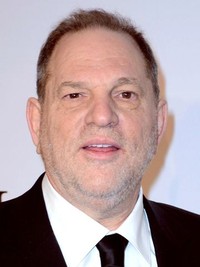Harvey Weinstein

Although Harvey Weinstein was once known as among the most influential movie producers of the 20th and 21st centuries, his name has since become far more strongly associated with allegations of sexual abuse and the birth of the #MeToo movement. Born in Queens, New York in 1954, Weinstein and his brother Bob first began producing rock concerts while attending The University at Buffalo. After dropping out of college and working as an assistant to a New York based Paramount executive in the late '70s, Weinstein and his brother eventually founded their own film production and distribution company, Miramax, and began entering the film industry with their preferred brand of arthouse and foreign cinema. The company took several years to become successful, staying afloat with small and little-seen films like "Playing for Keeps" (1986) and "Le Grand Chemin" (1987). In 1989, the Weinsteins landed two big breaks, Erroll Morris' landmark documentary "The Thin Blue Line" (1989) and Steven Soderbergh's smash hit indie drama "Sex, Lies, and Videotape" (1989), which both proved to be international hits. Now off and running, Miramax would become a premier studio and distributor in Hollywood, especially as a trend towards auteur and arthouse cinema swept through the '90s, with Miramax handling the movies like "Pulp Fiction" (1994), "The English Patient" (1996), "Good Will Hunting" (1997), and "Shakespeare in Love" (1998). Weinstein and his brother eventually left Miramax to found their own new studio The Weinstein Company in 2005, where the pair continued to produce acclaimed films such as "Inglorious Basterds" (2009), "The King's Speech" (2010), and "The Imitation Game" (2014). Though rumors often persisted in the mainstream press throughout Weinstein's success that he could be difficult to work with and sometimes rude, there were also much darker rumors surrounding him that rarely saw print, ones that finally came to light in 2017 when over 12 women came forward in articles published in The New York Times and The New Yorker with major allegation of Weinstein sexually harassing and assaulting them, and even retaliating against those who resisted his advances or spoke out against him by using his power in the industry to effectively end their careers. Almost as soon as the articles were published, several additional women began coming forward as well with additional stories of Weinstein threatening, cajoling, and forcing women into non-consensual sexual situations. The phenomenon became such a cultural touchstone on social media that soon, many other people both in and out of Hollywood began sharing their own stories of harassment and assault, spreading cultural awareness of the ubiquity of these behaviors under the banner of the hashtag #MeToo, created by activist Tarana Burke. Meanwhile, Weinstein was fired from his production company, which quickly went bankrupt, as well as ousted from the British Academy of Film and Television Arts and the Academy of Motion Picture Arts and Sciences. He was also left by his wife, fashion designer Georgina Chapman. During this same period, still more news reporting discovered that Weinstein had hired a private intelligence firm in an effort to stop the publication of stories about his alleged sexual assaults. In May of 2018, he was arrested in New York and charged with "rape, criminal sex act, sex abuse and sexual misconduct for incidents involving two separate women." Weinstein was released on $1 million bail with an ankle monitor to restrict his movement as he awaited trial. A trial date was set for January 6, 2020. when Weinstein was also charged in Los Angeles with raping one woman and sexually assaulting another in 2013. On February 24, 2020, a jury convicted Weinstein of two of five criminal charges: one count of criminal sexual assault in the first degree and one count of rape in the third degree. On March 11, 2020 he was sentenced to 23 years in prison. On July 20, 2021, Weinstein was extradited to California to face more charges relating to rape and sexual assault. The New York State Supreme Court, Appellate Division, First Department issued its decision on Weinstein's appeal, upholding the verdicts and judgment on June 2, 2022.